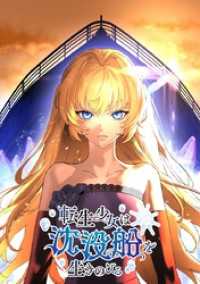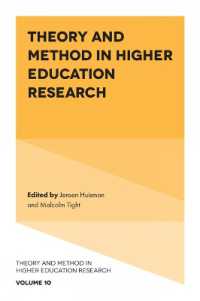- ホーム
- > 洋書
- > 英文書
- > Literary Criticism
Full Description
James Buchanan Elmore (1857-1942): Literary Ethnographer and Folk Poet details the life and work of Elmore as a "folk poet," emphasizing the importance in the cultural understanding of the ethnographic insights he gave as a farmer in the midwestern region of the United States that experienced dramatic social change after the Civil War. In song and verse, folk poets write of community events and personalities associated with them and of manifestations of natural forces with effects upon society. Often about locations overlooked by national historians and anthropologists, these writings are valued for their interpretations as participants within the cultural expressions describing group feeling and thought. By many estimates, Elmore left the largest legacy of folk poetic material in the United States, but not until now has a folklorist analyzed this rich trove of documentation for understanding the shifting folklife of the Midwest amid cultural shifts in the late nineteenth and early twentieth centuries. Baker illustrates that Elmore shows more similarities to folk poets such as South Carolina's Bard of the Congaree, journeyman printer J. Gordon Coogler (1865-1901), than with academic poets Wallace Stevens or even James Whitcomb Riley. Aptly nicknamed the Bard of Alamo, Elmore was his community's laureate—the voice of the-people—living in Indiana in the late nineteenth and early twentieth centuries and a recorder of folklife from the 1830s on the frontier until after the Civil War when industrialization swept through the nation.
Contents
List of Figures
Foreword: Ronald L. Baker and the Folk Imagination, Simon J. Bronner
Preface
Chapter One: Elmore's Life in Alamo and Classmates at Alamo Academy
Chapter Two: Elmore's Works, Literary Influences, and Critics
Chapter Three: Elmore's Shift from Romance Toward Realism in Prose
Chapter Four: Elmore as a Literary Ethnographer
Chapter Five: Elmore as a Folk Poet
Bibliography
About the Author
-

- 電子書籍
- 転生少女は沈没船を生きのびる【タテヨミ…
-

- 電子書籍
- 勧誘熱心☆マルチママ友 リアコミ






